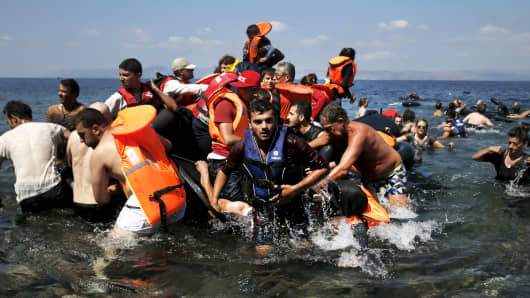The foundations for protecting refugees and migrants are a humane approach to human suffering and adherence to international humanitarian law. An improved screening and resettlement process would also improve the West's muddled response to today's displacement crisis.
Managing population flows was established by the Dublin Convention, which came into force in 1997. The Dublin Convention is a European Union law requiring that EU member states examine the application of asylum seekers seeking protection under the Geneva Convention. It also establishes a Europe-wide fingerprinting database for unauthorized entrants to the EU.
The scale of the current crisis has, however, overwhelmed the capacity of many countries.
Greece is receiving more than 1,000 migrants each day. Given Greece's financial limitations, it cannot process or meet the humanitarian needs of those arriving on its shores. Macedonia is a small country of 2.1 million people, which aspires to EU membership. It pushes migrants across its territory, unable to support the costs of relief or bear the social tensions arising from resettlement. Hungary's far-right government is mobilizing its armed forces and building a fence along its border with Serbia. Poland and Slovakia initially turned a blind eye to the crisis, announcing they would only admit Christian asylum seekers. The United Kingdom welcomes orphans — but few others. America's pathetic policy towards refugee resettlement in general, and Syrian refugees in particular, is especially grievous given its insipid efforts to address the root causes of Syria's civil war.
The Dublin Convention is essentially defunct when you look at Europe's response to the current crisis. A new system for burden sharing is needed among EU members.
The Dublin Convention assigns responsibility for screening and processing to the first country where displaced arrive. But it is unfair and unrealistic for front-line states, like Greece, to bear the lion's share of responsibility.
An EU-sponsored mechanism is needed to help meet urgent humanitarian requirements and build national capacity for managing the flow of refugee and asylum seekers.
Capacity-building has costs. A voluntary fund should be established, whereby wealthier EU states — like Germany — support the urgent requirements of refugees and asylum seekers arriving in countries with scarcer resources. The fund would also support processing centers.
No single country can absorb the tide of humanity seeking sanctuary. Jean-Claude Juncker, president of the European Commission, has proposed a quota system for resettlement. Germany is prepared to receive 800,000 refugees and migrants. However, tensions within Germany as well as intra-EU tensions will arise unless the burden is shared by other member states.
Europe cannot turn its back. Europe is a continent of refugees. From the Armenian genocide of 1915 through World War II, Europeans moved from place to place, fleeing persecution and poverty. Today's so-called united Europe must overcome divisions, recalling the experience of generations who were displaced and sought safe haven across the continent.
Effective policies must be reality-based. To be sure, Europe cannot reject asylum seekers, nor can it open its doors to any and all.
Screening typically seeks to distinguish between refugees who are fleeing war and violent conflict and economic migrants who seek economic opportunity. Most displaced persons come from failed and war-torn states where there is neither human nor financial security. A revised screening process should do away with this artificial distinction, taking a more nuanced and compassionate approach.
Screening must take in to account security concerns. No country can accept violent jihadis masquerading as refugees. Instability resulted in Eastern Congo when "interhamwe" infiltrated refugee populations to take over camps and radicalize the population. The same occurred in other conflict countries, such as East Timor.
Screening must be able to distinguish between victims and perpetrators. It should also take into account the recent history of asylum seekers. Should the victims of Syria's President Assad be treated differently than regime loyalists, who may now be hedging their bets by seeking asylum in Europe?
Effective screening can serve as an antidote to racism and xenophobia. Geert Wilders, the right wing Dutch politician, calls the recent wave of migrants an "Islamic invasion." Without effective screening, far right-wing personalities will galvanize greater support through hateful anti-immigrant rhetoric. This is the case in both Europe and the United States.
The twin pillars of an effective migration and refugee policy are moral principle and international humanitarian law. Replacing the Dublin Convention would help sanctuary countries establish benchmarks to calibrate their contributions and more effectively meet humanitarian needs.
Commentary by David L. Phillips, director of the Program on Peace-building and Human Rights at Columbia University's Institute for the Study of Human Rights. He served as a senior adviser and foreign- affairs experts to the State Department. His recently published book is "The Kurdish Spring: A New Map for the Middle East."






